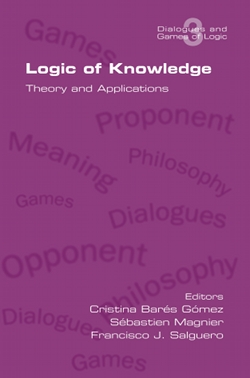|
|
|

Dialogues
 Back Back
 | Logic of Knowledge
Theory and Applications
Cristina Barés Gómez, Sébastien Magnier, and Francisco J. Salguero, eds.
The papers that constitute the present volume are a result of the interface between logic and knowledge where flow of information, agentivity, and the dialogical approach interweave in new and exciting ways in the context of what van Benthem calls the dynamic turn. Moreover one can read the present volume as providing different complementary variations and perspectives that should motivate and render future new cross-fertilizing dialogues between explicit epistemic and dialogical approaches. Indeed, according to this reading we
could distinguish the following pairs of interlocutors:
While the paper of F. Soler-Toscano & F.R. Velázquez-Quesada and Laura Leónides explore the dynamics induced by the arrival of new information in scientific processes such as abduction by means of non-monotonic approaches to
reasoning and knowledge, V. Fiutek studies the other side of the coin of non-monotonic reasoning, namely belief revision, in a dialogical setting.
While the paper of P. Seban and H. van Ditmarsch develops a model theoretic semantics for a generalization of Public Announcement Logic (PAL) in order to formalize the concept of ‘having the permission to say something to somebody’.
S. Magnier provides the semantic basis for the dialogical perspective on multi-agent public announcement logic with common knowledge.
While the paper of T. Tulenheimo explores the expressivity of interval-based temporal logic, N. Clerbout studies the expressivity of the dialogical approach in relation to a modal logic with actuality operator. Another study of the expressivity power of dialogical logic is the contribution of Fontaine
and Redmond who show how the inferential properties of the standard free logics can be expressed in the dialogical framework by delving in the local meaning of the quantifiers.
The papers of C. Barés Gómez and of Aude Popek present a new feature of the dynamic turn, namely its sensitivity and ability to deal with historic studies such as the study of conditionals in Ugaritic language and the reconstruction of the medieval theory of Obligationes.
9 May 2012
978-1-84890-074-5
|
|
|

